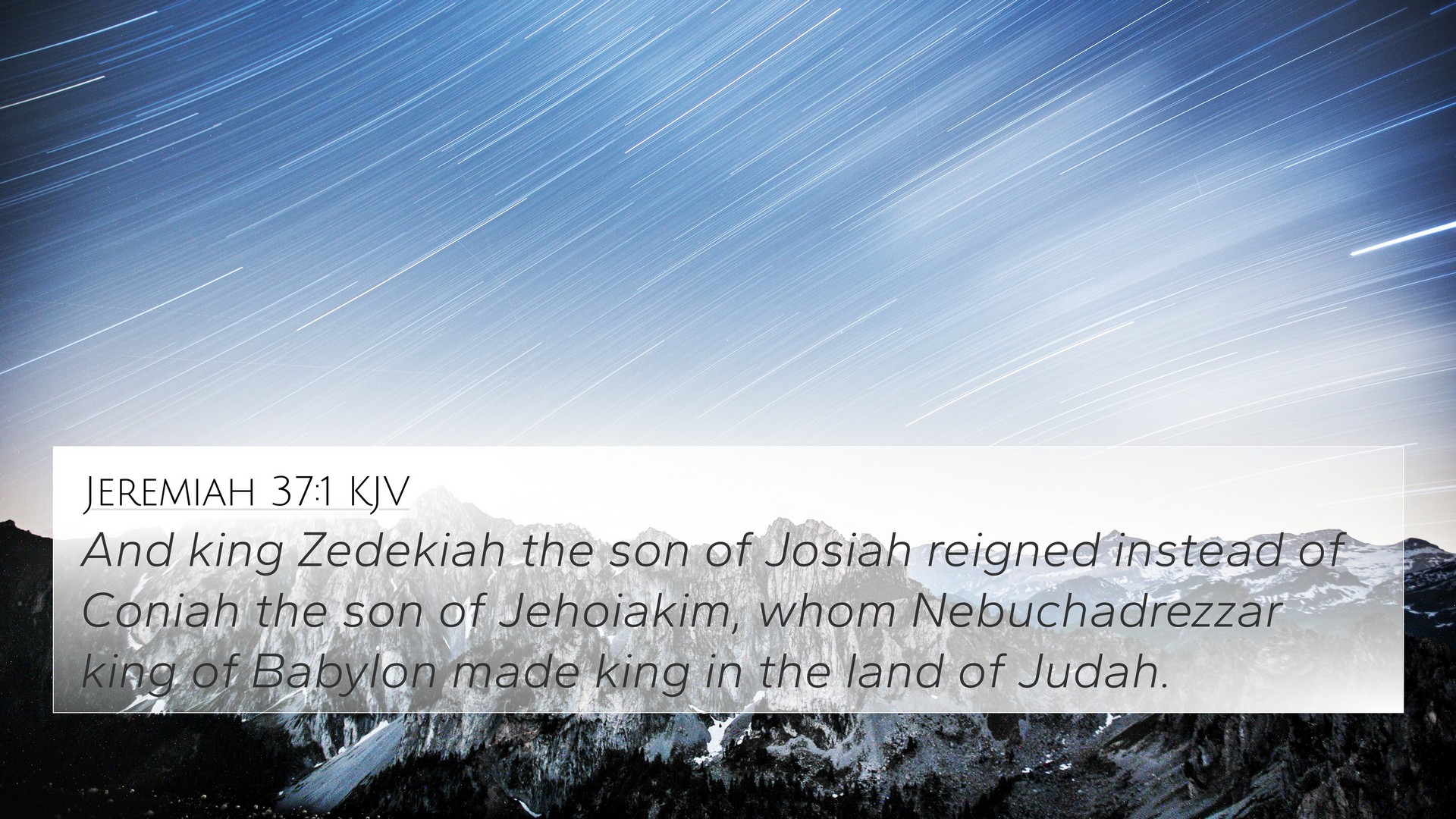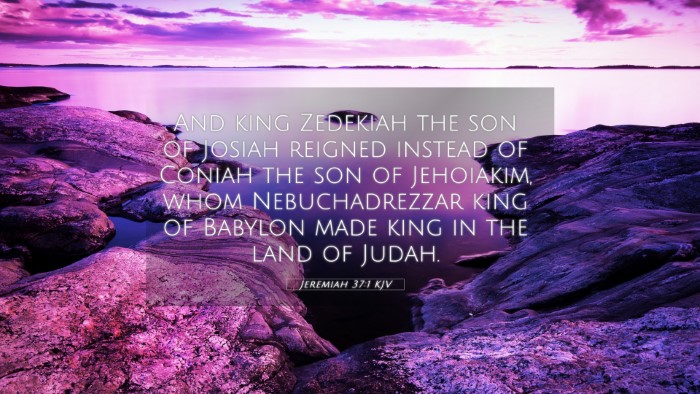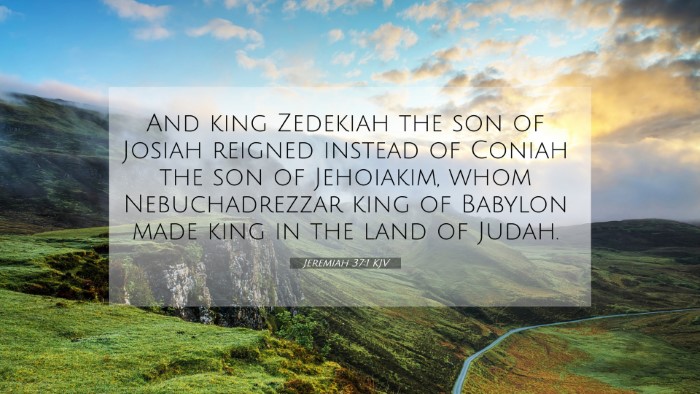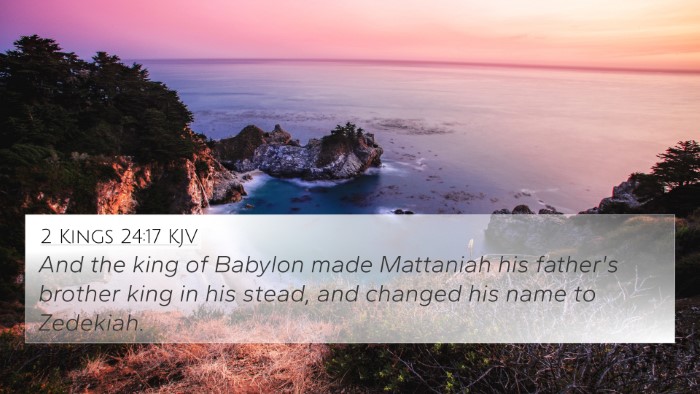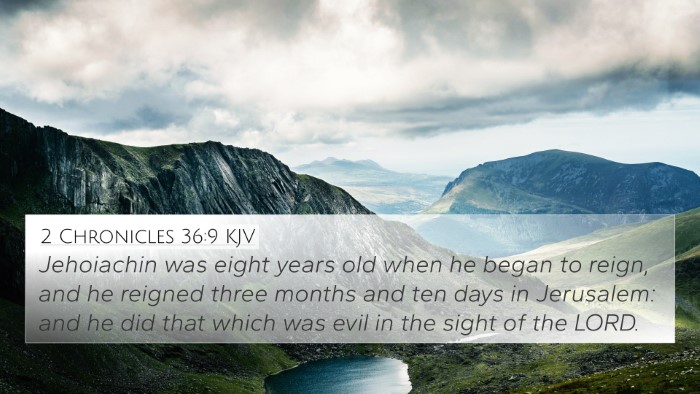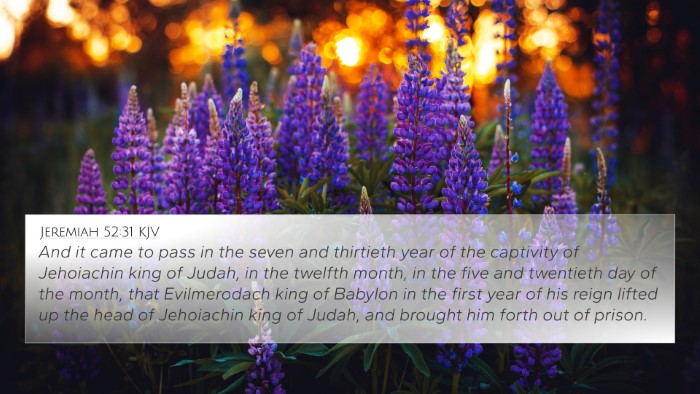Jeremiah 37:1 - Analysis and Interpretation
This verse states, "And King Zedekiah the son of Josiah reigned instead of Coniah the son of Jehoiakim, whom Nebuchadnezzar king of Babylon made king in the land of Judah." The context revolves around the political turmoil and prophetic implications during the late stages of the Kingdom of Judah.
Contextual Background
Jeremiah 37:1 embodies the transition of power in Judah during a tumultuous historical moment. Zedekiah, appointed by Nebuchadnezzar as a puppet king, marked a period of betrayal and instability. This text serves as a historical marker as well as a prophetic warning, emphasizing the consequences of disobedience to God and the futility of relying on human leadership over divine guidance.
Key Themes
- Political Instability: The transition from Jehoiakim to Zedekiah highlights the volatility of Judean power and the influence of Babylon.
- Prophetic Authority: Jeremiah's position as a prophet illustrates the dichotomy between divine commands and human governance.
- Divine Sovereignty: This verse affirms God's ultimate control over nations and rulers, even when they appear arbitrary or corrupt.
- Judgment and Mercy: It reflects the tension between God’s judgment on Judah for their sins and His continued warning and mercy through prophets like Jeremiah.
Cross-References for Further Study
- 2 Kings 24:17 - References the establishment of Zedekiah as king and his ties to Jehoiakim.
- 2 Chronicles 36:10 - Discusses the changing of leadership in Judah during the Babylonian reign.
- Jeremiah 22:24-30 - Prophetic declarations concerning the kings of Judah, especially Zedekiah.
- Ezekiel 17:13-14 - Discusses the symbolism of Zedekiah’s reign in the context of Israel's rebellion.
- Daniel 1:1-2 - Provides the backdrop of Babylon's dominance over Judah and the deportation of leaders.
- Isaiah 39:6-7 - Prophecy concerning the fate of Judah’s royal lineage due to their disobedience.
- Jeremiah 34:1 - God's guidance through Jeremiah during Zedekiah's reign and the socio-political situation in Judah.
- Lamentations 1:1-3 - Reflects on the sorrow of Jerusalem's fall, relating to Zedekiah's kingship as the last king of Judah.
- Matthew 1:12 - Traces the lineage of Jesus Christ through the kings of Israel and Judah, including Zedekiah.
- John 18:34 - References the concept of kingship and earthly authority as it relates to Jesus’ trial before Pilate.
Insights from Commentaries
- Matthew Henry: Emphasizes that Zedekiah’s reign illustrates a lack of true leadership and fidelity to God’s call, while the prophetic voice of Jeremiah serves as a beacon of hope amidst despair.
- Albert Barnes: Discusses the implications of Zedekiah’s appointment, indicating that it was part of God’s judgment against Judah’s unfaithfulness, yet maintaining the path of repentance through Jeremiah's prophecies.
- Adam Clarke: Highlights the significance of royal lineage and the reminder of the consequences that befall nations that disregard divine instructions, drawing parallels with historical and contemporary leadership failures.
Conclusion
Jeremiah 37:1 invites readers to reflect on the nature of leadership, the sovereignty of God, and the unfolding of prophetic history. Understanding the connections between this text and others enriches one’s grasp of the Bible’s overarching narrative. By studying these links, believers can gain insights into their faith journey and contextualize their experiences within God’s greater plan.
Using Cross-References Effectively
For those interested in exploring deeper connections, employing tools for Bible cross-referencing can enhance understanding of linked scriptures. A Bible concordance or a cross-reference Bible study guide can be invaluable resources. Understanding how to navigate these tools provides a pathway for discovering thematic Bible verse connections and establishing inter-Biblical dialogue.
In studying texts like Jeremiah 37:1 and their cross-references, one can effectively appreciate the scriptural tapestry woven throughout the Bible. Learning to identify connections between the Old and New Testaments adds depth to one’s theological comprehension, reinforcing the integrity and continuity of God’s message.
